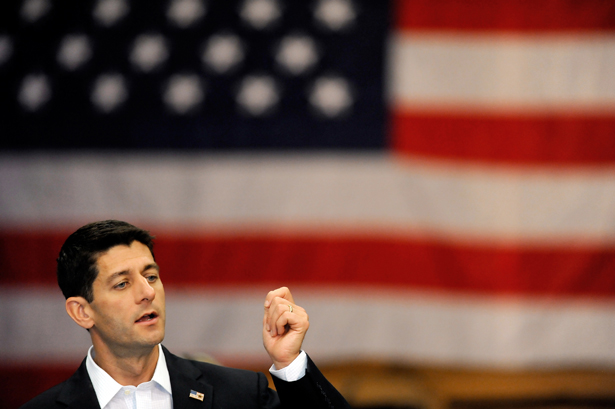
Republican vice presidential candidate, Rep. Paul Ryan, R-Wis., speaks during a campaign event at Partnership for Defense Innovation in Fayetteville, N.C., Thursday, Aug. 23, 2012. (AP Photo/Sara D. Davis)
One reads of people obsessed with finding Bigfoot or the Loch Ness monster or even Elvis. These folks may be silly, deluded and no doubt annoying, but for most of us, they are not really a problem. The same cannot be said of those pundits obsessed with a quest to locate that equally elusive creature, the intellectually honest, public-spirited conservative Republican politician. Combining their wishful delusion with an apparently congenital inability to admit error, these pundits are succeeding in the creation of an entirely fictional narrative about this year’s election.
That obscure object of pundit desire is, you may have guessed, Representative Paul Ryan. When Ryan released his first budget plan back in early 2010, mainstream media pundits struggled to find words sufficiently praiseworthy to do justice to the man’s courage, wisdom and good looks. At the New York Times, David Brooks wrote that Ryan’s plan “set the standard of seriousness for anybody who wants to play in this discussion.” Ryan “tackle[d] just about every politically risky issue with brio and guts,” Brooks gushed, and by “grasp[ing] reality with both hands,” he was “forcing everybody else to do the same.” Soon after, the Times op-ed page cheering squad signed up Joe Nocera and James Stewart, with the latter forced to imagine, somehow, that Ryan’s plan raised taxes on the rich. And at Slate, Jacob Weisberg was so bowled over by the beauty of Ryan’s “Good Plan!” that he pronounced it “brave, radical, and smart”—even as he felt compelled to admit that it would result in “negative effects…on future retirees, working families, and the poor” and was filled with “sleight-of-hand tricks” that ultimately made a mockery of Ryan’s deficit-reduction claims.
Given these weaknesses, one can only wonder what these pundits found so compelling about the plan. Was it that it shifted the burden of Medicare to future seniors by turning the program into a voucher plan? Was it that it lifted the tax burden from the extremely wealthy while significantly increasing the costs borne by the middle class? Was it the plan’s call for the complete elimination of taxes on capital gains and dividend income, such that even Mitt Romney admitted it would have wiped out his entire tax burden for the previous two years? Perhaps it was the plan’s unabashed attack on the social safety net via its steep cuts and death-blow changes to food stamps and Medicaid.
The pundits who declared their devotion to the man with the plan apparently failed to notice not only the actual contents of his proposal but also its ideological origins. An acolyte of Ayn Rand, Ryan has spent his entire professional life nestled in the well-funded womb of the Koch brothers and other billionaire funders of the Tea Party movement, attending their conferences, speaking at their rallies and cashing their checks.
Judged by the entirety of his career, Ryan is merely a good-looking version of a typical Obama-era Republican. He calls for budgetary discipline while exploding the deficit. He speaks of lowering taxes but merely shifts the burden to the middle class. Back in the Bush administration, he rarely met a boondoggle he didn’t embrace. On social issues, he may as well be Pat Robertson: Ryan co-sponsored a federal “fetal personhood” amendment, voted to defund Planned Parenthood, and offered legislation to prevent Medicaid from funding abortions even in cases of rape or incest.
Popular
"swipe left below to view more authors"Swipe →
Yet the punditocracy fantasy version of Ryan persists and has now corrupted the mainstream media’s narrative, as if Elvis actually were in the building and planning to sing “Love Me Tender” to the GOP in Tampa. As Matt Miller pointed out in the Washington Post, ever since Romney picked Ryan, the news “has been filled with talk of the ‘fiscal conservative’ [NPR] ‘intent on erasing deficits’ [New York Times] who has become ‘the intellectual heart of the Republican Party’s movement to slash deficits’ [Washington Post].” These are decidedly odd descriptions to apply to a politician whose original plan would have likely added $60 trillion to the national debt—reduced to a mere $14 trillion in its more recent formulation.
What lies behind the pundits’ need to create this fictional figure who, in the ridiculous words of the formerly respected right-wing historian Niall Ferguson, “is the one guy in Washington paying attention”? That’s a column for another day. Today’s problem is that the 2012 election may be decided by the punditocracy’s self-delusion and serial dishonesty. It is no exaggeration to say that Paul Ryan’s plan for America, now embraced by Mitt Romney, constitutes a declaration of class warfare by the superwealthy against the rest of us—coupled with an invitation to economic and environmental chaos, and with a side order of political repression and social regression.
Amazingly, what has eluded the smart folks in the punditocracy proved obvious, however briefly, even to someone as nutty as Newt Gingrich. Before being slapped down and forced to recant by the party’s commissars, he observed that Ryan’s plan amounted to “right-wing social engineering” and a Republican attempt to “impos[e] radical change from the right.”
Deluded that he actually had a chance to become president, Gingrich must have understood how unpopular Ryan’s schemes would prove to real people. For instance, when Priorities USA, the Democratic Super PAC, explained the plan’s details to focus group members, the listeners apparently told their interlocutors “they couldn’t believe a politician would support those policies.”
And so while the punditocracy has reacted with rapture to Romney’s choice of Ryan, a USA Today/Gallup poll found him the least popular Republican vice-presidential nominee since George H.W. Bush’s 1988 selection of Dan Quayle. Clearly, if armed with the truth about the Romney-Ryan plan, voters would mark this ticket “return to sender.” Is this why our pundits can’t handle it?


